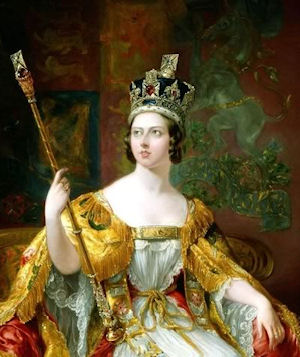Victoria - 1843 - Relations with Foreign Sovereigns
 In August 1843 the queen and Prince Albert paid a visit to King Louis Philippe at the chateau d'Eu. They sailed from Southampton for Treport in a yacht, and, as it happened to be raining hard when they embarked, the loyal members of the Southampton Corporation remembered Raleigh, and spread their robes on the ground for the queen to walk over. In 1844 Louis Philippe returned the visit by coming to Windsor. It was the first visit ever paid by a king of France to a sovereign of England, and Louis Philippe was much pleased at receiving the Order of the Garter. He said that he did not feel that he belonged to the "Club" of European sovereigns until he received this decoration. As the father of King Leopold of Belgium's consort, the queen was much interested in his visit, which went off with great success and goodwill. The tsar Nicholas had visited Windsor earlier that year, in which also Prince Alfred, who was to marry the tsar's grand-daughter, was born.
In August 1843 the queen and Prince Albert paid a visit to King Louis Philippe at the chateau d'Eu. They sailed from Southampton for Treport in a yacht, and, as it happened to be raining hard when they embarked, the loyal members of the Southampton Corporation remembered Raleigh, and spread their robes on the ground for the queen to walk over. In 1844 Louis Philippe returned the visit by coming to Windsor. It was the first visit ever paid by a king of France to a sovereign of England, and Louis Philippe was much pleased at receiving the Order of the Garter. He said that he did not feel that he belonged to the "Club" of European sovereigns until he received this decoration. As the father of King Leopold of Belgium's consort, the queen was much interested in his visit, which went off with great success and goodwill. The tsar Nicholas had visited Windsor earlier that year, in which also Prince Alfred, who was to marry the tsar's grand-daughter, was born.
In 1846 the affair of the "Spanish marriages" seriously troubled the relations between the United Kingdom and France. Louis Philippe and Guizot had planned the marriage of the duke of Montpensier with the infanta Louisa of Spain, younger sister of Queen Isabella, who, it was thought at the time, was not likely ever to have children. The intrigue was therefore one for placing a son of the French king on the Spanish throne. As to Queen Victoria's intervention on this question and on others, these words, written by W, E. Gladstone in 1875, may be quoted: "Although the admirable arrangements of the Constitution have now shielded the sovereign from personal responsibility, they have left ample scope for the exercise of direct and personal influence in the whole work of government. .. . The sovereign as compared with her ministers has, because she is the sovereign, the advantage of long experience, wide survey, elevated position and entire disconnection from the bias of party. Further, personal and domestic relations with the ruling families abroad give openings in delicate cases for saying more, and saying it at once more gently and more efficaciously, than could be ventured in the formal correspondence and rude contacts of government. We know with how much truth, fullness and decision, and with how much tart and delicacy, the queen, aided by Prince Albert, took a principal part on behalf of the nation in the painful question of the Spanish marriages."
The year 1848, which shook so many continental thrones, left that of the United Kingdom unhurt. Revolutions broke out in Paris, Vienna, Berlin, Madrid, Rome, Naples, Venice, Munich, Dresden and Budapest. The queen and Prince Albert were affected in many private ways by the events abroad. Panic-stricken princes wrote to them for political assistance or pecuniary aid. Louis Philippe abdicated and fled to England almost destitute, being smuggled over the Channel by the cleverness of the British consul at Havre, and the queen employed Sir Robert Peel as her intermediary for providing him with money to meet his immediate wants. Subsequently Claremont was assigned to the exiled royal family of France as a residence. During a few weeks of 1848 Prince William of Prussia (afterwards German emperor) found an asylum in England.
In August 1849 the queen and Prince Albert, accompanied by the little princess royal and the prince of Wales, paid a visit to Ireland, landing at the Cove of Cork, which from that day was renamed Queenstown. The reception was enthusiastic, and so was that at Dublin. "Such a day of jubilee," wrote The Times, "such a night of rejoicing, has never been beheld in the ancient capital of Ireland since first it arose on the banks of the Liffey." The queen was greatly pleased and touched. The project of establishing a royal residence in Ireland was often mooted at this lime, but the queen's advisers never urged it with sufficient warmth. There was no repugnance to the idea on the queen's part, but Sir Robert Peel thought unfavorably of it as an "empirical" plan, and the question of expense was always mooted as a serious consideration. There is no doubt that the absence of a royal residence in Ireland was fell as a slur upon the Irish people in certain circles.
During these years the queen's family was rapidly becoming larger. Princess Alice (afterwards grand duchess of Hesse) was born on the 25 April 1843; Prince Alfred (afterwards duke of Edinburgh and duke of Saxe-Coburg-Gotha) on the 06 August 1844; Princess Helena (Princess Christian) on 25 May 1846; Princess Louise (duchess of Argyll) on 18 March 1848; and Prince Arthur (duke of Connaught) on the 01 May 1850.
|
NEWSLETTER
|
| Join the GlobalSecurity.org mailing list |
|
|
|

